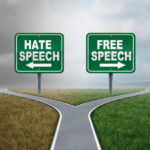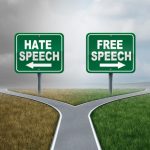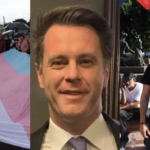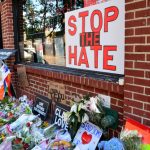Expanding the Offence of Hate Speech Will Unjustifiably Impede Free Speech
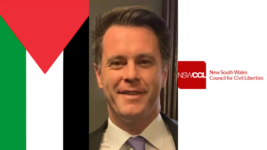
The NSW government announced this week it is contemplating redrafting hate speech laws, as the criminal offence of hate speech enacted in 2018 has not resulted in a single conviction. So, rather than seeing the absence of convictions as evidence the new offence has acted as a deterrent, premier Chris Minns views it as a failure in the law itself.
Hate speech has come to the fore over recent weeks, as part of the fallout resulting from the wholesale massacre of more than 11,000 Palestinian people trapped in the walled-off region of Gaza by the Israeli state, which has spoken with genocidal intent, while western allies simply look on.
This issue arose after an antisemitic chant broke out briefly during a pro-Palestinian rally gathered at the Sydney Opera House on 9 October, to protest the decision of the premier to project the Israeli flag onto the building to mark the Hamas-perpetrated 7 October killing of over 1,300 Israelis.
This antisemitic sentiment is not the norm at Sydney Palestinian rights rallies. And organisers put the incident down to an unknown element in the crowd.
Indeed, antisemitic and Islamophobic incidents are continuing to occur around the nation as our leaders repeat their support for Israel, which has completely disregarded any of the norms established via the international law that governs war.
In the wake these incidents, the NSW Jewish Board of Deputies and Faith NSW lobbied to have the “ineffective and impotent” rules changed and hate criminals put behind bars, as the concept of such laws being preventative doesn’t appear to be a valid goal regarding the outcome of a law anymore.
“Something’s got to change”
“You’ve got to have a situation… where it does result in charges in the end, and I don’t think anyone would, with a straight face, make the claim that hate speech has been extinguished in this state,” Minns told the Daily Telegraph on Monday.
“If you’re going to have a law on the books saying racial vilification and hate speech is not allowed in NSW, then it can’t be toothless,” the premier added, as he went on to outline that his government is set to review the current vilification law to consider whether it has the desired effect.
Palestine Action Group Sydney spokesperson Josh Lees told Sydney Criminal Lawyers the week following the Monday night action that Minns had come under a lot of criticism as a result of the protest having taken place.
According to the Palestinian ally, “the idea that it should be up to the whim of a politician of the day as to whether or not you get to protest is appalling, and that’s part of the climate that’s been created by the antiprotest laws”.
Politicians have questioned the validity of holding actions in support of Palestine. Yet, as all of the public assemblies have gone ahead, it has been shown, they’re obviously legal. And it’s also clear that pro-Palestinian sentiment is being criminalised, in line with the approach taken to climate defence.
Racial vilification
Then NSW attorney general Mark Speakman oversaw the passing of 2018 legislation that inserted section 93Z into the Crimes Act 1900 (NSW), to effectively create the offence of publicly threatening or inciting violence on grounds of race, religion, sex, gender or intersex or HIV/AIDS status.
This vilification law provides that publicly threatening violence toward a person or a group based on the protected attributes stated in the offence is against the law. And to do this, can see an individual sent away for up to three years or fined $11,000, while corporations can cop a $55,000 fine.
“The new offence will replace four existing serious vilification offences contained in the Anti Discrimination Act 1977,” Speakman explained on tabling his bill. “Laws protecting identified groups from threats of violence are important to securing the safety of the NSW community.”
Yet, questions about effectiveness have been raised ever since. The awareness campaign regarding the law, Stop Public Threats, wasn’t launched until two years after it was passed. And a Nazi insignia ban was established in 2021, as it was found that 122 antisemitic incidents reported resulted in no charges.
A prosecution can’t be launched against individuals charged under 93Z without the authorisation of the NSW Director of Public Prosecutions, which Minns has identified as a stipulation too far in terms of applying the offence, and this clause may be erased in order to facilitate broader application.
Religious voice to parliament
Both the NSW Perrottet government and the Minns-led NSW Labor opposition ran on platforms that included the establishment of a religious body made up of leaders from various faith groups, who, once nominated to the council, would provide advice to the executive via the immigration minister.
The Catholic premier and his government are still putting together what will be known as the NSW Faith Affairs Council, which is a multifaith group consisting 16 members, 12 of whom have already been chosen.
However, an application to be part of the council on the part of Sydney Atheists president Steve Marton has been turned down. And this is despite groups, like the Rationalist Society of Australia, pointing out that a third of NSW residents identified as having no religion at the last Census.
Following suggestions that Labor lost the religious vote in western Sydney at the federal election, the council proposal appears to be an effort to regain this ground, whilst the government continues to operate within varying degrees of Christian association, including beginning sessions of parliament with the Lord’s Prayer.
But with leaders the western world over having recently been evoking religious wars, it would seem a concerted effort to promote secularism within the community, long overdue, is needed right now.
The criminalising project
“We are concerned about recent media commentary suggesting that the Minns government is considering ‘tightening laws against hate speech’ based on lobbying undertaken by faith-based groups,” said NSW Council for Civil Liberties (NSWCCL) president Lydia Shelly.
The lawyer made clear in her 14 November statement that “speech that is controversial, that falls short of the current legal threshold, should not be criminalised. We already have criminal provisions outlawing the use of offensive language and prohibition against incitement to violence in NSW.”
Shelly added that divisive speech that continues to be legal should be “challenged, debated, or even ridiculed”. And this must take place in the media, as well as more generally in public, with these tactics being used to deal with such issues, rather than further criminalising the ability to use words.
As it stands in Australia, there is already a thorough counterterrorism framework established in law, and there’s still room within the polity to raise and deal with divisive topics and opinions, rather than simply attempting to silence those seeking to express diverging opinion.
The NSWCCL is calling on the Minns government to make any reports regarding a tightening of these laws publicly available, along with the minutes of meetings dealing with hate speech reform and the details of correspondence on the topic, as well as that involving any lobbying that takes place.
“If the legal threshold is lowered, it will not make faith communities any safer from a perceived risk of violence or the risk of actual violence occurring. Dragging people before the courts will not make communities safer,” Shelly recently warned.
“Instead, the lowering the threshold will potentially have a chilling effect on public discourse and perversely, make it difficult for police and intelligence organisations to monitor those who may plan to resort to violence,” she further said, in an attempt to pave a different way forward.


